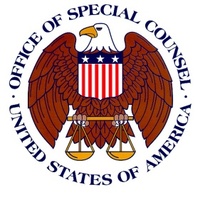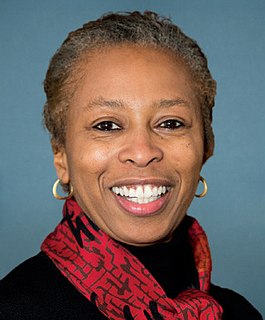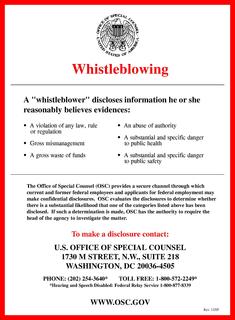A whistleblower is a person, usually an employee, who exposes information or activity within a private, public, or government organization that is deemed illegal, illicit, unsafe, or a waste, fraud, or abuse of taxpayer funds. Those who become whistleblowers can choose to bring information or allegations to surface either internally or externally. Over 83% of whistleblowers report internally to a supervisor, human resources, compliance, or a neutral third party within the company, with the thought that the company will address and correct the issues. Externally, a whistleblower can bring allegations to light by contacting a third party outside of the organization such as the media, government, or law enforcement. The most common type of retaliation reported is being abruptly terminated. However, there are several other activities that are considered retaliatory, such as sudden extreme increase in workloads, having hours cut drastically, making task completion impossible or otherwise bullying measures. Because of this, a number of laws exist to protect whistleblowers. Some third-party groups even offer protection to whistleblowers, but that protection can only go so far. Two other classifications of whistleblowing are private and public. The classifications relate to the type of organizations the whistleblower works in: private sector, or public sector. Depending on many factors, both can have varying results. About 20% of whistleblowers are successful in stopping the illegal behaviors, usually through the legal system, with the help of a whistleblower attorney. In order for the whistleblower’s claims to be credible and successful, the whistleblower must have compelling evidence to support their claims, that the government or regulating body can use or investigate to "prove" such claims and hold corrupt companies and/or government agencies accountable. A whistleblower case would never continue on legally, or ever be reported via the news, without substantial and compelling evidence.

The Sarbanes–Oxley Act of 2002, also known as the "Public Company Accounting Reform and Investor Protection Act" and "Corporate and Auditing Accountability, Responsibility, and Transparency Act" and more commonly called Sarbanes–Oxley or SOX, is a United States federal law that set new or expanded requirements for all U.S. public company boards, management and public accounting firms. A number of provisions of the Act also apply to privately held companies, such as the willful destruction of evidence to impede a federal investigation.
A privacy policy is a statement or legal document that discloses some or all of the ways a party gathers, uses, discloses, and manages a customer or client's data. Personal information can be anything that can be used to identify an individual, not limited to the person's name, address, date of birth, marital status, contact information, ID issue, and expiry date, financial records, credit information, medical history, where one travels, and intentions to acquire goods and services. In the case of a business, it is often a statement that declares a party's policy on how it collects, stores, and releases personal information it collects. It informs the client what specific information is collected, and whether it is kept confidential, shared with partners, or sold to other firms or enterprises. Privacy policies typically represent a broader, more generalized treatment, as opposed to data use statements, which tend to be more detailed and specific.

Pierre Marcel Poilievre is a Canadian politician who served as Minister for Democratic Reform from 2013 to 2015 and Minister of Employment and Social Development in 2015. He is currently a member of Parliament (MP), representing the suburban Ottawa riding of Carleton and serves as the Opposition critic for jobs and industry, having served as the critic for finance and the National Capital Commission from 2017 to 2021.

The United States Office of Special Counsel (OSC) is a permanent independent federal investigative and prosecutorial agency whose basic legislative authority comes from four federal statutes: the Civil Service Reform Act, the Whistleblower Protection Act, the Hatch Act, and the Uniformed Services Employment and Reemployment Rights Act (USERRA). OSC's primary mission is the safeguarding of the merit system in federal employment by protecting employees and applicants from prohibited personnel practices (PPPs), especially reprisal for "whistleblowing." The agency also operates a secure channel for federal whistleblower disclosures of violations of law, rule, or regulation; gross mismanagement; gross waste of funds; abuse of authority; and substantial and specific danger to public health and safety. In addition, OSC issues advice on the Hatch Act and enforces its restrictions on partisan political activity by government employees. Finally, OSC protects the civilian employment and reemployment rights of military service members under USERRA. OSC has around 120 staff, and the Special Counsel is an ex officio member of Council of Inspectors General on Integrity and Efficiency (CIGIE), an association of inspectors general charged with the regulation of good governance within the federal government.
The National Security Whistleblowers Coalition (NSWBC), founded in 2004 by former FBI translator Sibel Edmonds in league with over 50 former and current United States government officials from more than a dozen agencies, is an independent, nonpartisan alliance of whistleblowers who have come forward to address weaknesses of US security agencies.

The Clerk of the United States House of Representatives is an officer of the United States House of Representatives, whose primary duty is to act as the chief record-keeper for the House.
Information privacy, data privacy or data protection laws provide a legal framework on how to obtain, use and store data of natural persons. The various laws around the world describe the rights of natural persons to control who is using its data. This includes usually the right to get details on which data is stored, for what purpose and to request the deletion in case the purpose is not given anymore.
Congressional oversight is oversight by the United States Congress over the Executive Branch, including the numerous U.S. federal agencies. Congressional oversight includes the review, monitoring, and supervision of federal agencies, programs, activities, and policy implementation. Congress exercises this power largely through its congressional committee system. Oversight also occurs in a wide variety of congressional activities and contexts. These include authorization, appropriations, investigative, and legislative hearings by standing committees; which is specialized investigations by select committees; and reviews and studies by congressional support agencies and staff.

The Federal Accountability Act is a statute introduced as Bill C-2 in the first session of the 39th Canadian Parliament on April 11, 2006, by the President of the Treasury Board, John Baird. The aim was to reduce the opportunity to exert influence with money by banning corporate, union, and large personal political donations; five-year lobbying ban on former ministers, their aides, and senior public servants; providing protection for whistleblowers; and enhancing the power of the Auditor General to follow the money spent by the government.

The Access to Information Act or Information Act is a Canadian Act providing the right of access to information under the control of a federal government institution. As of 2020, the Act allowed "people who pay $5 to request an array of federal files". Paragraph 2. (1) of the Act ("Purpose") declares that government information should be available to the public, but with necessary exceptions to the right of access that should be limited and specific, and that decisions on the disclosure of government information should be reviewed independently of government. Later paragraphs assign responsibility for this review to an Information Commissioner, who reports directly to parliament rather than the government in power. However, the Act provides the commissioner the power only to recommend rather than compel the release of requested information that the commissioner judges to be not subject to any exception specified in the Act.

The committees of the Australian Senate are committees of Senators, established by the Australian Senate, for purposes determined by that body. Senate committees are part of the operation of the Australian parliament, and have for some decades been involved in maintenance of government accountability to the Australian parliament, particularly through hearings to scrutinise the budget, and through public inquiries on policy questions.
The Lloyd–La Follette Act of 1912 began the process of protecting civil servants in the United States from unwarranted or abusive removal by codifying "just cause" standards previously embodied in presidential orders. It defines "just causes" as those that would promote the "efficiency of the service." August 24, 1912, § 6, 37 Stat. 555, 5 U.S.C. § 7511

The Federal Funding Accountability and Transparency Act of 2006 is an Act of Congress that requires the full disclosure to the public of all entities or organizations receiving federal funds beginning in fiscal year (FY) 2007. The website USAspending.gov opened in December 2007 as a result of the act, and is maintained by the Office of Management and Budget. The Congressional Budget Office estimates S. 2590 will cost $15 million over its authorized time period of 2007–2011.

The Whistleblower Protection Act of 1989, 5 U.S.C. 2302(b)(8)-(9), Pub.L. 101-12 as amended, is a United States federal law that protects federal whistleblowers who work for the government and report the possible existence of an activity constituting a violation of law, rules, or regulations, or mismanagement, gross waste of funds, abuse of authority or a substantial and specific danger to public health and safety. A federal agency violates the Whistleblower Protection Act if agency authorities take retaliatory personnel action against any employee or applicant because of disclosure of information by that employee or applicant.
The anti-gag statute is a little-known legal boundary in the long struggle in the United States between Executive Branch secrecy and the United States Congress and the public's right to know. Since 1988, the statute has been an annual appropriations restriction drawing the line on Executive branch efforts to limit whistleblowing disclosures to information that is specifically identified in advance as classified. The anti-gag statute requires a mandatory, specifically worded addendum on any nondisclosure policy, form or agreement to legally spend money to implement or enforce the gag order.
The Public Servants Disclosure Protection Act came into force in Canada on April 15, 2007. The Act creates two distinct processes: a disclosure process and a reprisal complaints process. It also creates two new bodies: the Office of the Public Sector Integrity Commissioner (PSIC) and the Public Servants Disclosure Protection Tribunal.

A whistleblower is a person who exposes any kind of information or activity that is deemed illegal, unethical, or not correct within an organization that is either private or public. The Whistleblower Protection Act was made into federal law in the United States in 1989.
Whistle Blowers Protection Act, 2011 is an Act of the Parliament of India which provides a mechanism to investigate alleged corruption and misuse of power by public servants and also protect anyone who exposes alleged wrongdoing in government bodies, projects and offices. The wrongdoing might take the form of fraud, corruption or mismanagement. The Act will also ensure punishment for false or frivolous complaints.
Whistleblower protection in Australia is offered for certain disclosures under a patchwork of laws at both federal and state level. Eligibility for protection depends on the requirements of the applicable law and the subject matter of the disclosure. Not all disclosures are protected by law in Australia. At federal level, whistleblowers face potential imprisonment for making disclosures about certain subjects, including national security and immigration matters. Transparency International






